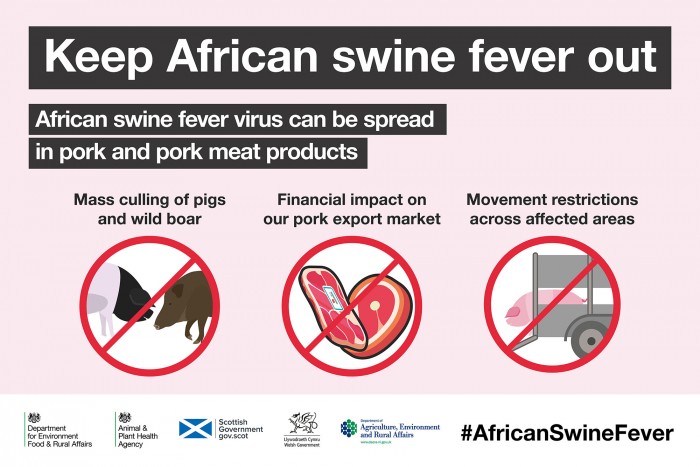A UK-wide exercise that simulates an outbreak of African swine fever (ASF) will take place this week to test government contingency plans to contain and eliminate the disease in the event that it reached the UK.
The exercise takes on extra significance with the news last week that the virus has been detected in domestic pigs in Germany for the first time.
The exercise, which is named ‘Exercise Holly’, will see the Animal and Plant Health Agency, Defra, Scottish Government, the Welsh Government and the Department of Agriculture, Environment and Rural Affairs in Northern Ireland (DAERA-NI) working together to test the government’s contingency plans to respond to a national outbreak of ASF, enabling teams from across the country to work together to assess the UK’s state of readiness to manage such an outbreak.
In a joint statement, the UK’s four Chief Veterinary Officers said: “The risk of African swine fever arriving in the UK is ever present and would have a devastating impact on our pigs and pig keepers if it ever reached our shores. We regularly test our contingency plans in this way to ensure that we are ready to respond to potential future disease outbreaks.
“Everyone can do their bit to help stop animal diseases spreading to this country through simple actions such as not bringing any pork products back to the UK and disposing of leftovers and food waste in secure bins that wildlife cannot access.”
The virtual exercise, which starts on Thursday July 22 and will conclude on Friday July 23, will help improve the UK’s animal disease response capabilities through testing plans, instructions and the structures employed in managing an outbreak. A lessons identified report will be published after the exercise, with any improvements implemented to strengthen our national contingency plans.
The Government said everyone can help to stop the spread of ASF to the UK by doing the following:
- If you have visited ASF-affected areas in Europe, or elsewhere in the world, you must not bring any pork or pork products back to the UK.
- Dispose of leftovers or food waste in secure bins that pigs or wildlife cannot access.
- Farmers, the public and members of the food industry should practise high biosecurity standards, including never feeding catering waste, kitchen scraps or meat products to pigs which is illegal and can spread the disease.
The NPA has been helping the planning team shape the exercise. Chief executive Zoe Davies gave an overview of the pig industry in a presentation to over 200 delegates, including 35 overseas invitees from trading partners, at an introductory event.
“The exercise is really important to test readiness and resilience. NPA will be using the scenarios that will be played out this week to test our own contingency plans and ensure that we are as ready as we can be,” she said.
ASF, which has resulted in the deaths of millions of pigs worldwide and caused significant disruption to the meat trade in Asia, Africa and, increasingly parts of Europe through the movement of wild boar. While there has never been an outbreak of ASF in the UK, the simulated exercise is an important part of testing the UK’s plans to prevent and respond to a potential future outbreak.
ASF poses no risk to human health as it only affects pigs and related animals. ASF spreads between animals, but the virus can also be transmitted through feeding infected meat to other animals.
The government currently deems the risk of the virus being brought into the UK in animal products from affected countries, including from illegal imports, to be at ‘
medium’ risk.




